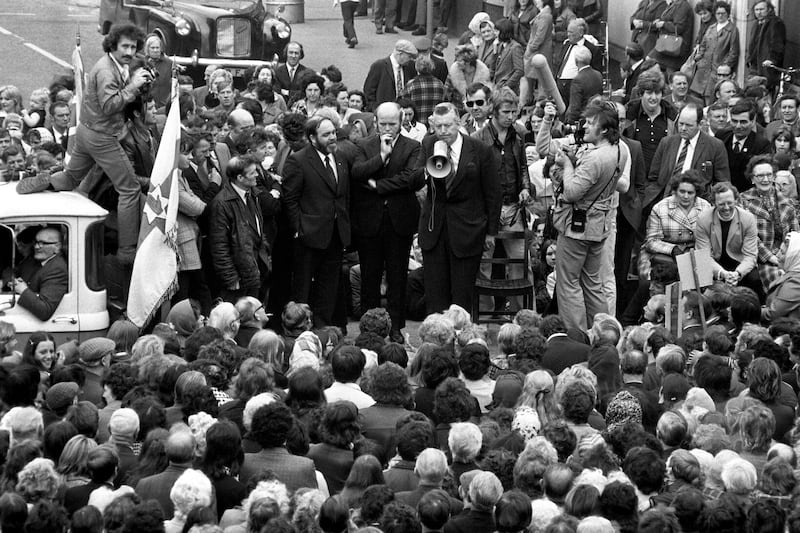Fifty years ago unionism was engaged in an ideological electoral battle between pro-Sunningdale and anti-Sunningdale forces: the United Ulster Unionist Council (with support from loyalist paramilitaries) versus Brian Faulkner and a much smaller pro-power sharing, pro-devolution grouping. The UUUC won that battle but didn’t ever reap the benefits of supposed victory.
Right now, unionism is engaged in yet another ideological electoral battle, this time between the DUP and UUP (who support the deal to reboot the assembly) and the TUV and Reform UK (who reject both the deal and devolution in its present form). It’s not entirely clear where the loyalist paramilitaries stand, although it is clear they don’t have the muscle to bring Northern Ireland to a standstill. It’s not entirely clear, either, where the Orange Order stands, although it hasn’t the input and influence it had in 1974.
It looks to me as though the outcome of this battle will be much the same as it was in May 1974 and, indeed, after the May 1998 referendum: there won’t be any clear winners and unionism /loyalism will remain as divided as ever. The DUP and UUP appeared, a few weeks ago, to be edging towards some sort of political/electoral rapprochement; yet the UUP seems to be upping the ante in terms of its we’re-standing-in-every-constituency rhetoric and continuing attacks on DUP policy.

Realignment is often talked about across unionism: although it tends to focus on competing arguments for either just one party (a very big tent), or else two electoral blocs (a sort of traditional unionism versus a more liberal small-u variety). The problem is that neither of those represents a genuine realignment, because one assumes that all unionists are basically the same, while the other assumes that all small-u unionists are also the same. So, both those forms of realignment would simply change the nature of existing divisions, while doing absolutely nothing to prevent further division. All they would do is make a bad situation even worse than it has been since the first serious divisions began to emerge in the mid-1960s.
Realignment is important. Unionism cannot survive without it. But it isn’t enough just to take the existing elements of unionism and jiggle them around a little. Realignment must embrace the entirety of unionism/loyalism/pro-union/ambivalent/biddable and so on. Unionism is not one community. I’m not sure it ever was. It is a collection of communities bound together—although much more loosely now than they were when the NI Parliament was created—by a belief that continuing membership of the United Kingdom (even though that Kingdom changed in 1920) was and remains preferable to the alternative.
Realignment must begin with the conversations and questions which unionism has avoided since the prorogation of the NI Parliament in March 1972. Had it initiated those conversations and addressed those questions back then, it would probably have avoided the serial divisions and multitude of offshoots. In the past few years, for example, we’ve seen the emergence of the UKUP, NIUP, NIAP, NI21, TUV and UCUNF. Two of the three independent MLAs are unionist, while the TUV/Reform UK linkage is just another unionist hybrid.
I’m not even going to list the number of unionist electoral vehicles that have come and gone since 1972; or the electoral pacts of convenience that come and go; or the Heinz variety number of interest groups, focus groups, mavericks, hand-me down influencers and would-be Carsons. And let’s not forget the paramilitary elements, the Protestant mainstream and offshoots and the Orange Order.
Unionism’s biggest problem—it’s a whopping, debilitating one in fact—is the sheer number of vehicles and voices which claim to speak for it. And the main way of speaking about and promoting their own version of unionism is to attack some, or even all of the other versions of unionism. Actually, the reason we have so many vehicles and voices is because the unionist communities have never sat down and discussed just one key question: What does it mean to be a unionist in Northern Ireland?
I know there are lots of other questions which need asked and answered, but that is the key one. Without agreeing an answer to that question then it is inevitable that the competing vehicles and voices will continue to grow and grow and keep on growing. Even trying to answer that question will likely produce new divisions, not least because there is a section of unionism determined to find one word of Lundyism in a billion words of pan-unionist conversation.
If the agreed answer to that question is something like, ‘To be a unionist in Northern Ireland is to promote, protect and preserve the union that is the United Kingdom,’ then what is the next question? Maybe something like, ‘How do unionists here best promote, protect and preserve that union’? That’s when it becomes difficult, because there is an increasing divide between those who believe a stable NI with a devolved, power sharing assembly is the best way and those who believe that power sharing with SF is actually damaging to the union.
I’m not pretending that unionism having this sort of conversation will be easy. Hell, I’m not even pretending that enough of them will get to the end of the conversation to make the project worthwhile. But having observed and written about unionism for 45 years (my first piece was for the News Letter in August 1979) and been involved in the UUP for some of that time, I know unionism. I know what makes it tick. And I know—because I’ve been observing it for so long—that its future now depends on an honest conversation about itself, with itself and focused entirely upon its survival as a viable political/electoral/ideological force.
The constant struggle about who is the strongest, purist, no-nay-never type of unionist is a clinically bonkers approach to the challenges every variety of unionism faces at this moment. It is an existential moment. And if unionism loses the moment there’ll be no further need for questions.







